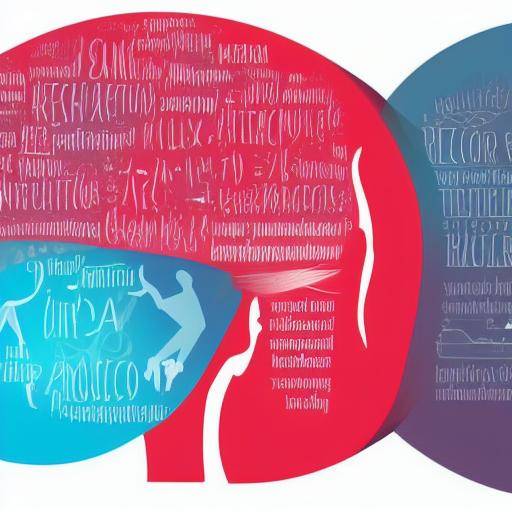
Introduction
We live in a fast and demanding world, where stress can become overwhelming. Stress management is essential to maintain an emotional and mental balance. In this article, we will explore how emotional intelligence can be used as an effective tool to manage stress. We will discover its importance, benefits, and how to apply it in everyday life to achieve optimal mental well-being.
History and Background
Emotional intelligence has its roots in the work of pioneer psychologists such as Peter Salovey and John Mayer in the early 1990s. His concept was popularized by renowned psychologist Daniel Goleman in his book "Emotional Intelligence". Since then, it has evolved as a crucial area in psychology and mental health.
The evolution of emotional intelligence has been marked by significant milestones, such as its recognition in academic areas and its integration into education and the business world. Over the years, it has been shown that emotional intelligence plays a key role in managing stress and overall well-being.
Detailed Analysis
Benefits of Emotional Intelligence in the Management of Stress
Emotional intelligence offers many benefits to cope with stress. It helps identify and regulate emotions, promotes empathy and management of interpersonal relationships, and promotes self-consciousness and self-control. These skills are fundamental to managing stressful situations effectively.
Challenges in Emotional Intelligence Development
Despite its benefits, developing emotional intelligence can present challenges. Some people may find it difficult to identify and regulate their emotions, which can hinder stress management. However, with appropriate practice and tools, it is possible to overcome these challenges and improve emotional intelligence.
Current trends in the Management of Stress and Emotional Intelligence
The current society is increasingly aware of the importance of managing stress and promoting mental health. This has led to increased attention to emotional intelligence, with a greater focus on its integration into educational, labour and self-care environments.
Comprehensive review
Applications Emotional Intelligence Practices for Stress Management
The practical applications of emotional intelligence in stress management are varied. From the application of mindfulness techniques to effective conflict management, emotional intelligence offers concrete tools to address stress in different aspects of everyday life.
Best Practices in Emotional Intelligence Development
The development of emotional intelligence requires specific practices, such as self-reflection, active listening and emotional management. Implementing these practices on a regular and consistent basis can lead to a significant improvement in managing stress and emotional well-being.
Comparative analysis
The management of stress, emotional intelligence and mental well-being are intrinsically related. While each addresses different aspects, there is an important interconnection between them. By combining stress management approaches with the development of emotional intelligence, it is possible to achieve comprehensive mental well-being.
Practical Tips and Recommendations
Practical Tips to Use Emotional Intelligence in the Management of Stress
- Practice full daily care to keep calm in stressful situations.
- Use conscious breathing techniques to reduce anxiety and stress.
- Cultivate empathy and compassion towards yourself and others to promote healthy relationships and emotional support.
Conclusions and FAQs
Conclusion
In conclusion, emotional intelligence is a powerful tool for managing stress and promoting mental well-being. By developing skills such as self-consciousness, self-regulation, empathy and relationships management, we can face stress more effectively and cultivate a healthier emotional state.
Frequently asked questions
1. How can I develop my emotional intelligence to manage stress?
Developing emotional intelligence can be achieved through self-reflection, empathy practice, self-control and full attention. Looking for guidance from a mental health professional can also provide specific tools and strategies for stress management.
2. What is the role of emotional intelligence in the workplace to manage stress?
In the workplace, emotional intelligence is critical to managing high-pressure situations, resolving conflicts and fostering a healthy working environment. This helps to reduce stress and promote employee well-being.
3. Are there specific emotional intelligence practices that are effective in managing stress?
Practice self-consciousness, self-control and empathy can be highly effective in managing stress. In addition, time management techniques, effective communication and problem solving are fundamental in the application of emotional intelligence for stress management.
4. How can emotional intelligence improve mental well-being in general?
Emotional intelligence can improve mental well-being by allowing us to manage stress more effectively, promote healthy relationships, foster emotional resilience and cultivate a positive attitude. This contributes to a generalized welfare state.
5. What are some signs that I can work on my emotional intelligence to better manage stress?
Some signs that you can work on your emotional intelligence to manage stress include difficulty regulating your emotions, frequent anxiety or irritability experiences, and challenges to maintaining healthy interpersonal relationships at stressful times.
6. Is it possible to improve emotional intelligence at any age?
Yes, emotional intelligence is a skill that can be improved and developed throughout life. Regardless of age, spending time and effort to practice emotional intelligence skills can lead to significant improvements in stress management and emotional well-being.
In short, emotional intelligence is an essential element in managing stress and promoting mental well-being. By understanding and applying its principles, we can cultivate a greater emotional balance and face challenges with greater resilience. Its impact extends to various areas of our lives, promoting healthy relationships, a productive working environment and a generalized welfare state.






















































